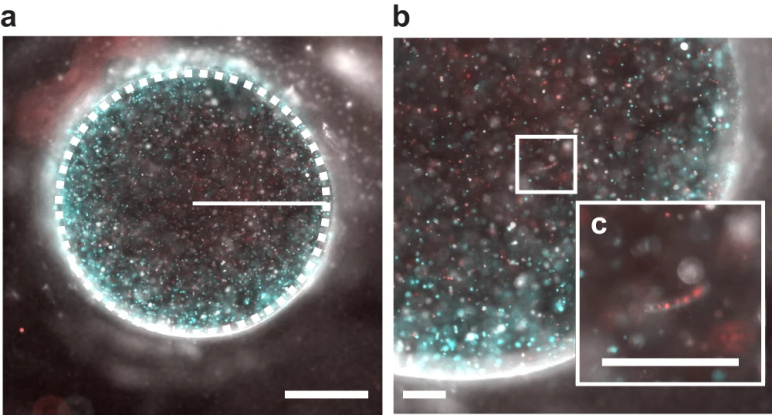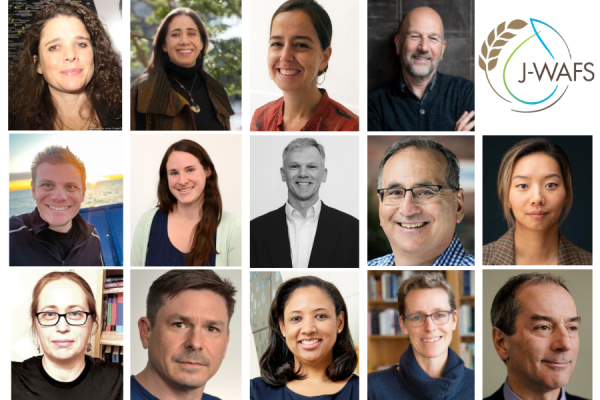Our Research Denitrifying capsules to clean water sources

Schematic shows how sunlight and environmental nutrients supply the resources for algae that in turn support denitrification in the interior to convert nitrate to nitrogen gas naturally and efficiently.

Shown is a 3 mm particle embedded with bacteria that scrub nitrate from the water and algae that provide food for the bacteria. Insets b and c highlight the algae inside the capsules. Photo credit: Ciccarese, D., Tantawi, O., Zhang, I.H. et al. Microscale dynamics promote segregated denitrification in diatom aggregates sinking slowly in bulk oxygenated seawater. Commun Earth Environ 4, 275 (2023).
Principal Investigator
Andrew Babbin
- Associate Professor
- Department of Earth, Atmospheric and Planetary Sciences
Professor Andrew Babbin is a field-going oceanographer, biogeochemist, and climate scientist. He joined the MIT faculty in 2017 in the Department of Earth, Atmospheric and Planetary Sciences. His research exploring how microorganisms shape global climate has taken him across the world, sampling lakes in Antarctica, coral reefs in Cuba, anoxic waters in the Pacific, and air in the Galapagos. He is the recipient of numerous recognitions, including an NSF CAREER award and a recent MIT Bose research grant to study shark migrations as a tracer of ocean chemistry.
Photo credit: Andrew Babbin
Challenge:
Can we prevent harmful algal blooms before they begin?
Research Strategy
- Target and remove anthropogenic nitrogen from natural waters
- Apply knowledge of natural ecosystem dynamics to clean contaminated waters
Project description
Nitrogen is an essential nutrient for the growth of all biological organisms, but ecosystems must maintain a precarious balance: two little nitrogen restricts overall productivity but too much leads to overgrowth of plants and harmful algal blooms. To feed ourselves, society artificially generates nitrogen-based fertilizer through the Haber-Bosch process, and humans have now doubled the global rate of natural nitrogen supply. Unfortunately, as much as two-thirds of the nitrogen fertilizers that we amend across croplands wash off into local waterways where they stimulate algal blooms that can be toxic, leading to hypoxia and fish kills, and damaging precious drinking water sources.
This project proposes a new frontier extending our knowledge of nitrogen cycling in marine systems to construct capsules that will scrub local waterways (rivers, streams, and coastal estuaries) from excess anthropogenic nitrogen to prevent algal blooms. Eliminating algal blooms before they start will secure water for drinking and other societal purposes, as well as prevent eutrophic conditions that lead to hypoxia and losses for fisheries. The team plans to design self-sustaining capsules that preferentially let specific, non-toxic algae grow inside of them, and are paired with bacteria that use the live algal material to scrub nitrogen from water.
News
Additional Details
Impact Areas
- Water
- Climate & Sustainability
Research Themes
- Water Purification & Desalination
- Water Resources & Infrastructure
- Sustainability & Adaptation
Year Funded
- 2024
Grant Type
- Seed Grant
Status
- Ongoing

